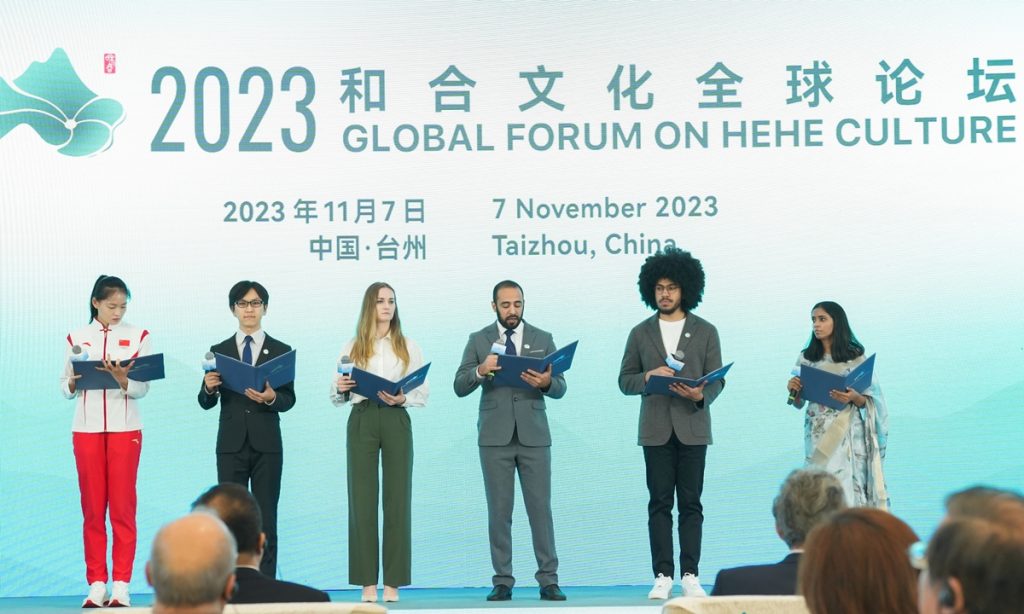Harmony and peace ‘guide to resolving a chaotic world’

The harmony and peace seen in China's time-honored Hehe culture is needed now more than ever in today's world, which is suffering from dreadful conflicts and tense wars, said experts and officials from China and abroad at the 2023 Global Forum on Hehe Culture on Tuesday.
Kicking off in Tiantai county, East China's Zhejiang Province, on Tuesday, the forum brings together about 500 scholars, government officials, representatives from international organizations and diplomats from over 10 countries, including China, the US, Japan, South Korea, and Bulgaria, to discuss ways to look for positive inspiration from Hehe culture to promote exchanges and mutual learning.
Experts and officials said the value of Hehe culture originates from the wisdom of ancient China and how its theories on what makes a harmonious society could act as a guide to resolve conflicts today and build trust and mutual learning among people and countries around the world.
Hehe culture, which originated in the Tiantai Mountains in Taizhou, Zhejiang Province, embodies the concept of harmony. The first "he" in Hehe means harmony, peace, and balance, while the second "he" means convergence, unity, and cooperation, according to a press release from the forum.
"This [Hehe culture] is a cultural ideal that our people seek. Harmony between nature and society and between the individual and the group is the ideal of our people and the basis of our cohesiveness and creativity," Irina Bokova, former director-general of UNESCO, said at the opening ceremony.
She told the Global Times in an exclusive interview that Hehe culture nowadays is greatly needed as people fight to solve climate change and protect biodiversity. Its values echo the declaration on cultural diversity UNESCO adopted more than 20 years ago, which is that cultural diversity is important to humanity.
She said that every culture has contributed to the big river that is human civilization. Hehe culture is about listening and inclusiveness. It is about how Buddhism, Confucianism and Taoism influenced each other, and "is the expression of how our human civilization launches different ideas around the world and brought us closer to each other."
Yukio Hatoyama, former Japanese prime minister and president of the East Asian Community Institute, said in the face of current grim and complex global trends and humanitarian crises, people now more than ever need the "heart of peace" seen in Hehe culture as a guide to advocate mutual respect, mutual understanding and mutual help.
The two international guests were presented trophies as "ambassadors of Hehe culture."
Another promoter of Hehe culture, David William Ferguson, honorary chief English editor of Foreign Languages Press and an Orchid Award winner, told the Global Times in an exclusive interview that the idea of Hehe culture is a very important foundation of the Global Civilization Initiative and a global community with a shared future, which reflects the idea of setting aside differences and embracing harmony.
"China has been successful when it's applied the principles from ancient times right through the period," he said, emphasizing the significance of the forum as "We need the creation of a new multipolar order in which everyone has a voice, in which everyone's voice is heard, and in which everyone agrees to follow the rules."
The Hehe World Initiative was proposed at the opening ceremony. Youth representatives from China, Lebanon, Belarus, Brazil, Japan and India read out the initiative in multiple languages, expressing the common aspiration of the youth of all countries to promote the spirit of Hehe culture and build a better world.
Adham Sayed, one of the youth representatives from Lebanon, told the Global Times that the harmony and peace conveyed by Hehe culture is significant in today's world. As a youth from the Middle East, a region with a lot of conflict and wars, he is willing to promote the culture to more youths around the world for a better future.
Li Qiaoqiao, the Chinese representative and a karate champion at the recent Hangzhou Asian Games, told the Global Times in an exclusive interview that she could see Hehe culture from her sports experience in China, which is friendship is more important than competition. This harmonious and peaceful attitude allowed her to calm down and be more tolerant when taking part in competitive sports.
Aiming to promote Hehe culture to the world, Chinese and English editions of the book This is Hehe Culture were officially released at the event while a trailer for a documentary on Hehe culture was screened.